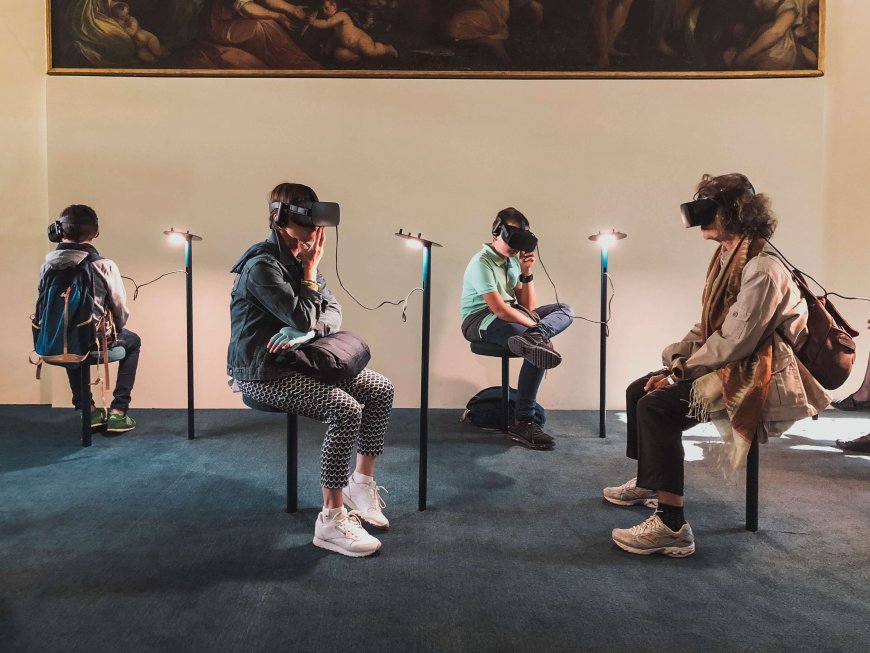Enhancing Reality: Exploring the Limitless Possibilities of Virtual Reality (VR)
VR technology is a computer-generated simulation of a three-dimensional world or experience that may be interacted with through the use of specialized hardware such as a headset, gloves, or controllers. The goal of virtual reality is to provide a realistic and immersive experience that makes the user feel as if they are there in a different location or circumstance, even if they are physically in a different region.

What is VR or Virtual Reality?
VR technology is a computer-generated simulation of a three-dimensional world or experience that may be interacted with through the use of specialized hardware such as a headset, gloves, or controllers. The goal of virtual reality is to provide a realistic and immersive experience that makes the user feel as if they are there in a different location or circumstance, even if they are physically in a different region.
Users in virtual reality may often walk around and interact with items or features within the virtual environment, which respond in real-time to their actions. By the use of stereoscopic displays and motion tracking, the technology creates a convincing illusion of depth and perspective, which is sometimes supplemented by spatial audio to enhance the impression of presence.
Learn about Virtual Reality
What are the applications of Virtual Reality (VR)?
1) Education: VR has the ability to completely transform the education sector. Imagine being able to take virtual field visits to historical places or museums, or simulating intricate scientific investigations that are either too risky or too expensive to perform in real life. VR can provide students with an immersive learning experience that engages them and makes studying more fun.
2) Healthcare: VR may potentially be used to improve patient outcomes in healthcare. Doctors can imitate medical treatments in virtual settings, allowing them to plan and rehearse before conducting them on actual patients. VR may also be used to assist people to overcome phobias, PTSD, and other mental health disorders by generating virtual scenarios.
4) Entertainment: VR is already making ripples in the entertainment sector, but its full potential has yet to be realized. Imagine being able to watch a concert or a sporting event from the comfort of your own home, or completely immersing yourself in a film or video game. VR has the ability to offer a fully immersive experience, unlike anything we’ve ever seen.
5) Real estate: VR may also be utilized to make virtual tours of properties in the real estate sector. This is especially handy for purchasers who live in different areas of the world since it allows them to see houses without physically traveling. Architects and designers may also use VR to mimic building projects before they are created, making it easier to discover possible concerns before work begins.
6) Training and Simulation: Virtual reality may be used for creating realistic training scenarios for a wide range of industries, including the military, aviation, and law enforcement. These simulations can assist trainees in gaining practical experience in a safe and controlled setting, therefore preparing them for real-world scenarios.
VR has a wide range of possible uses, and as technology advances, we should expect to see even more fascinating innovations in the near future. VR has the potential to change the way we live, work, and play in a variety of ways, from education to healthcare to entertainment. It’s an exciting time in the world of virtual reality, and we can’t wait to see what the future brings.
image source:
https://unsplash.com/photos/IMUwe-p1yqs?utm_source=unsplash&utm_medium=referral&utm_content=creditShareLink
What's Your Reaction?












/https://tf-cmsv2-smithsonianmag-media.s3.amazonaws.com/filer_public/54/66/546650fa-26a4-40fd-8d6d-5a7a04540f81/rosetta2.png)
:max_bytes(150000):strip_icc():focal(999x0:1001x2)/robert-prevost-050825-1-39395418ab494da5a3a700c9478e66c8.jpg)
















































format(webp))
format(webp))


























